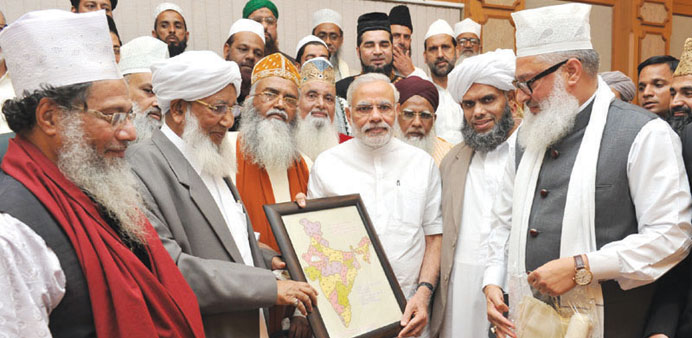Kanthapuram AP Aboobacker Musliyar presenting a momento to Modi.
By Ashraf Padanna
Gulf Times Correspondent
A meeting of two prominent Kerala Muslim scholars with Narendra Modi in New Delhi has triggered speculation about the prime minister’s attempts to reach out to the minorities in Kerala.
Kanthapuram AP Aboobacker Musliyar and Syed Ibrahim Khaleel al-Bukhari, leaders of prominent All India Jamiyyathul Ulema, met Modi in New Delhi along with a group of scholars following the Sufi tradition.
The group runs hundreds of seminaries and modern schools across the southern state.
The meeting in the Prime Minister’s Office assumes significance since his Bharatiya Janata Party (BJP) has started an aggressive campaign ahead of civic polls less than three months away.
Muslims constitute 26.56% of Kerala’s 34mn population.
The leaders later described the Thursday evening meeting as “very detailed and fruitful”.
“We also discussed of the ways in which we can propagate the values and principles of Sufi inspired moderate Islam,” Musliyar said in a statement. “Hope he and his government will look into the details of this discussion seriously and will translate it into action soon.”
Though the Hindu nationalists are yet to open an account in Kerala Assembly or control any of the 1,000-odd local governments, they have been making a steady increase in both vote share and rank and file.
The party established a comfortable lead in at least four assembly segments in the last year’s parliamentary elections, and it was maintaining the momentum in mood surveys, mostly at the expense of the opposition Communists.
The group, which used to show an affinity towards communists, has recently been drifting towards the Congress party in the state. Last week, Chief Minister Oommen Chandy visited Musliyar in his headquarters and closeted with him for a few minutes.
“The prime minister explained to us various projects and programmes his government initiated aiming at the betterment of this marginalised community, particularly the youth among them. We detailed to him ... their contributions to its civilisational growth and the necessity to take this community and their concerns seriously,” he said.
“Had an extremely enriching interaction,” Modi later tweeted. “The delegation gave valuable inputs to promoting Sufi culture across India, including promoting Sufi music and literature”.
He said the delegation “rightly pointed out” that Islam didn’t preach hatred or extremism. The need of the hour, he said, was to marginalise forces promoting militancy.
“I talked about how (the) Muslim community must take maximum advantage of skill development initiatives of the government. This will benefit Muslim youth,” another tweet said. “Sufism is an integral part of India’s ethos and has greatly contributed to creation of a pluralistic, multicultural society in India”.
“I thank the delegation of Sufi scholars for appreciating government’s efforts to work towards India’s development irrespective of caste or religion”.
He said the ideology propounded by Sufi saints was an integral part of Indian ethos and had contributed significantly to the creation of a pluralistic, multicultural society in India.
He said forces of extremism were attempting to weaken the Sufi ideology today.
“It is essential for Sufi saints and scholars to counter these forces through various avenues including on social media so that the ideology of extremism does not take root in India,” he said.
“The tradition of Sufism has kept evil at bay, wherever it has continued to flourish”.
He exhorted the Muslim community to take maximum advantage of the skill development schemes and programmes being initiated by his government. He assured the delegation to look into the issues of Waqf property. The delegation suggested the creation of a “Sufi circuit” to promote tourism and steps for the rejuvenation of Sufi shrines and sites in India.
The delegation members included Hazrat Syed Mohamed Ashraf Kichhowchhwi, president and founder of the All India Ulama and Mashaikh Board, Hazrat Syed Jalaluddin Ashraf, chairman, Makhdoom Ashraf Mission, Kolkata, Hazrat Syed Ahmed Nizami, Sajjada Nashin, Dargah Hazrat Nizamuddin Auliya, New Delhi, Hazrat Syed Mehndi Chishty, functionary of the Dargah-e-Khwaja Moinuddin Chishti, Ajmer, and Nesar Ahmed, educationist.

